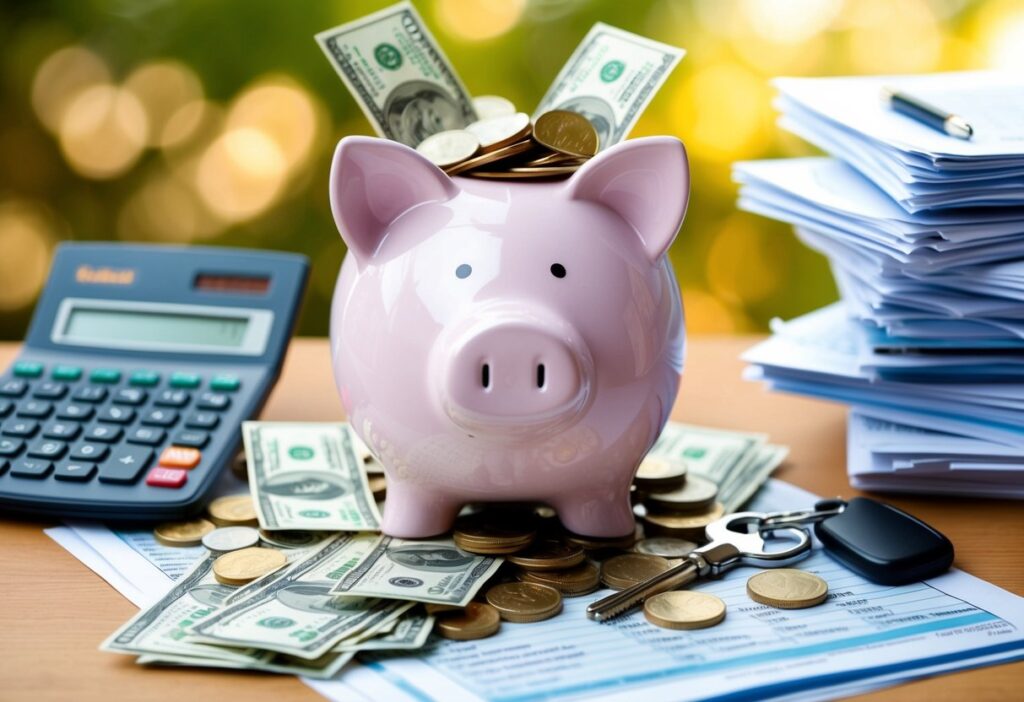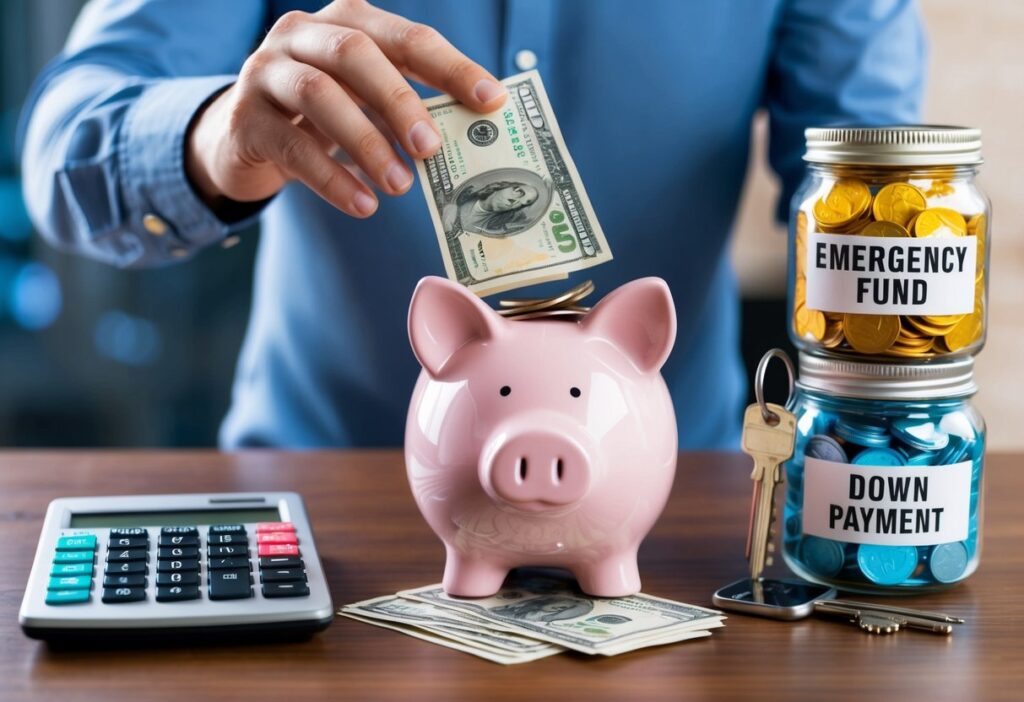Anúncios
Buying a home is one of the biggest financial decisions most people will make. It’s a milestone that requires careful planning, especially when it comes to saving money beforehand.

Many experts recommend saving 20% of the home’s purchase price for a down payment. They also suggest saving an additional 3-5% for closing costs and moving expenses. However, the ideal amount to save before buying your first home depends on your local housing market, income, and financial goals.
First-time homebuyers often have options that require less money upfront, including FHA loans with down payments as low as 3%. When planning your home purchase, it’s important to consider not just the down payment but also emergency funds, ongoing maintenance costs, and your overall debt-to-income ratio.
Understanding Home-Buying Budget Basics

Before house hunting, you need to establish a clear financial plan that accounts for both upfront costs and long-term affordability. This means taking a realistic look at your current finances and calculating how much house you can truly afford.
Assessing Your Financial Health
Start by checking your credit score. Lenders typically offer better interest rates to borrowers with scores above 740.
Pay down existing debts to improve your debt-to-income ratio (DTI), which should ideally be below 36%.
Build an emergency fund covering 3-6 months of expenses separate from your down payment money. This provides a financial safety net after your home purchase.
Review your income stability. Lenders favor borrowers with steady employment for at least two years. Self-employed individuals may need to provide additional documentation.
Track your spending habits for 2-3 months to identify areas where you can cut back and boost savings. Small changes like reducing dining out can add up significantly over time.
Determining Your Home-Buying Budget
The 28/36 rule serves as a useful guideline: spend no more than 28% of gross monthly income on housing costs and keep total debt payments under 36% of income.
Sample Monthly Budget Calculation:
- Gross monthly income: $6,000
- Maximum housing payment (28%): $1,680
- Maximum total debt payments (36%): $2,160
Remember to account for all homeownership costs:
- Mortgage payment
- Property taxes
- Homeowners insurance
- HOA fees (if applicable)
- Maintenance (budget about 1% of home value annually)
- Utilities
Online mortgage calculators can help estimate payments at different price points. Pre-approval from a lender provides a realistic maximum budget, but consider setting your target below this amount for financial flexibility.
Saving Strategies for Your First Home Purchase

Building a solid financial foundation for your home purchase requires systematic saving approaches. The right strategies can significantly accelerate your journey toward homeownership while ensuring you maintain financial stability.
Setting a Realistic Savings Goal
Determining how much to save begins with understanding the full cost of buying a home. Aim to save 20% of the purchase price for a down payment to avoid private mortgage insurance (PMI).
Don’t forget closing costs, which typically range from 2-5% of the loan amount. These include:
- Loan origination fees
- Title insurance
- Home inspection
- Attorney fees
- Transfer taxes
Additionally, set aside 1-3% of the home’s value for moving expenses and immediate repairs. Many financial experts recommend having a separate emergency fund covering 3-6 months of housing expenses before buying.
Use a home savings calculator to create specific targets based on your local market and desired timeline. Breaking down your goal into monthly amounts makes the process less overwhelming.
Effective Saving Techniques
Automate your savings to ensure consistency. Set up direct deposits from your paycheck into a dedicated high-yield savings account for your home fund.
Consider these methods to boost your savings rate:
Budget adjustments: Review monthly expenses and identify areas to trim. Even small changes like reducing dining out can add hundreds to your home fund monthly.
Income increases: Allocate 50-100% of raises, bonuses, and tax refunds to your home savings account.
Side hustles: Temporary gigs can accelerate savings without permanently altering your lifestyle.
Many first-time buyers benefit from specialized accounts like:
- First-time homebuyer savings accounts (available in some states with tax benefits)
- Roth IRAs (allowing withdrawal of contributions penalty-free)
Track your progress monthly to stay motivated and adjust strategies as needed.
Timing Your Purchase
Market conditions significantly impact both home prices and mortgage rates. Historically, winter months often feature less competition and potentially lower prices.
Monitor interest rate trends through financial news sources. Even a 0.5% difference in mortgage rates can save or cost thousands over the life of a loan.
Your personal timeline should align with broader financial milestones. Consider postponing your purchase until you’ve:
- Reduced high-interest debt
- Stabilized your employment situation
- Improved your credit score to qualify for better rates
Many successful homebuyers report saving for 2-4 years before making their purchase. This patience typically results in stronger financial positioning and less stress during the buying process.
Additional Costs to Consider

Buying a home involves much more than just the down payment. There are several other expenses you’ll need to budget for to avoid financial strain after your purchase.
Closing Costs and Fees
Closing costs typically range from 2% to 5% of your loan amount. These include lender fees, appraisal costs, title insurance, and attorney fees.
For a $300,000 home, expect to pay between $6,000 and $15,000 in closing costs. Some lenders offer “no closing cost” mortgages, but these usually have higher interest rates.
First-time homebuyers should ask sellers to contribute toward closing costs. This is a common negotiation point in many markets.
Some closing costs to prepare for:
- Loan origination fee: 0.5% to 1% of loan amount
- Home inspection: $300-$500
- Appraisal fee: $300-$600
- Title search and insurance: $1,000-$3,000
Maintenance and Emergency Funds
Experts recommend setting aside 1% to 3% of your home’s value annually for maintenance. This means $3,000 to $9,000 for a $300,000 home.
Major repairs often come unexpectedly. A new roof might cost $8,000-$15,000, while HVAC replacement can run $5,000-$10,000.
Smart homeowners keep a dedicated emergency fund just for home repairs. This should be separate from your regular emergency savings.
Older homes typically require more maintenance than newer construction. Factor this into your budget if you’re considering an older property.
Consider setting up automatic transfers to a “home maintenance” account each month. Even $100-$200 monthly builds a solid buffer against surprise expenses.
Property Taxes and Insurance
Property taxes vary significantly by location. The national average is about 1.1% of a home’s value annually, but rates range from 0.3% to over 2% depending on the state and county.
Homeowners insurance costs about $1,200 per year on average but can be much higher in disaster-prone areas. Flood or earthquake insurance may be additional expenses.
Mortgage lenders usually require these costs to be escrowed. This means they’re added to your monthly mortgage payment.
Don’t forget about HOA fees if buying in a planned community. These can range from $100 to over $500 monthly and typically increase yearly.
Some municipalities also charge special assessments for local improvements. Research these potential costs before making an offer.